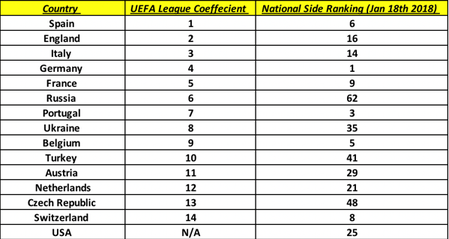Diarmuid is a final year undergraduate student at University College Cork.
In recent years UEFA has tried to increase the importance of international football. Such measures include the spreading out of European Championship qualification fixtures over a week period rather than just a couple of days and more recently the introduction of the UEFA Nations League. The Nations League aims to decrease the number of meaningless friendly games as well as reduce the number of one-sided matches often shared between nations. Except for fans from smaller countries, who are keen to see big names such as Harry Kane or Antoine Greizman, nobody benefits from seeing a nation like England or France beating San Marino 7-0. The Nation League aims to pit countries of similar standings against each other, by putting them into small groups. On top of this, these groups will have promotion and relegation and can be used as a way for nations to qualify for the next European Championships. Football fans can now look forward to seeing gigantic fixtures such as England vs Spain and Germany vs France. Irish fans will look forward to seeing the Boys in Green get their chance to get revenge on Christian Eriksen and Denmark, the cause of the nation's most painful footballing night since that Thierry Henry handball.
For this study I use UEFA club coefficients as the base value for Europe’s top 14 countries. The top 14 leagues in Europe are presented below.
There are also many national teams that are out performing their national leagues on the club scene. These countries tend to be small but have big talent pools of players who play abroad. The most obvious example is Belgium. The Belgium national team currently sits 5th in the FIFA rankings and has held 1st in recent times. But thanks to the Premier League, in particular, many of their stars such as Eden Hazard (Chelsea), and Kevin De Bruyne (Manchester City) play weekly at the highest level.
What might be the reasons for difference between the national team and domestic league? It now consider some possible answers.
Effect % Of Foreign Players In Leading National Leagues.
With the recent success of both Spanish clubs and in particular the national team it should come as no surprise that out of Europe’s top 5 leagues, La Liga has the fewest % of foreign players at 42.8%. While England and Italy whose national teams have struggled in recent times have the highest % of players playing in their top leagues at 69.2% and 55.5%. Surprisingly 49.2% of players in the German Bundesliga are foreign, placing them smack in the middle of Italy and Spain. In club leagues with lower standards such as Belgium, Portugal, Austria and the Czech Republic their national teams are helped if their players move abroad to the top 5 leagues. Players get to play against the best domestically and in the Champions League which is a huge advantage when major competitions such as the World Cup come around.
Effect of Population On The Standard Of Club and National Football
Bigger populations tend to mean more players and more investment which means more quality players, which means a better standard. Although this is not always the case, take the United States for example. The US failed to qualify for Russia 2018 despite having a much bigger population than their qualifying opponents. On top of this the national team sits 25th in the current FIFA rankings. While Major League Soccer has improved in recent years, it is unlikely to ever reach the heights of Europe’s top 5 leagues, despite these countries having smaller populations.
It is interesting to note according to UEFA rankings, Europe’s top four leagues are La Liga (Spain) 1st, Premier League (England) 2nd, Seria A (Italy) 3rd and Bundesliga (Germany) 4th. But these four nations are in the opposite order in terms of population. Germany 80.67 million, Italy 60.6 million, England 53.01 million and Spain 40.56 million. These four countries have some of Europe’s biggest populations. With a population of 45 million, just a million short of Spain, again it could be said that the both Ukrainian national team and club league under perform. Countries with relatively small populations doing particularly well at the moment include Switzerland whose national team have a world ranking of 8th.
Dose The Standard Of Living Have An Effect On The Success Of The National Team?
In extreme cases yes. Countries such as Germany and France have very high standards of living and they have both strong national and club football leagues. According to the World Economic Forum the five countries with the highest standard of living are; 1st Norway, 2nd Iceland, 3rd Luxembourg, 4th Switzerland and 5th Denmark. Only Switzerland can boast to be home of one of Europe’s top 14 football leagues. But, the Swedish and Icelandic national teams make it into FIFA’s top 20 national sides.

 RSS Feed
RSS Feed